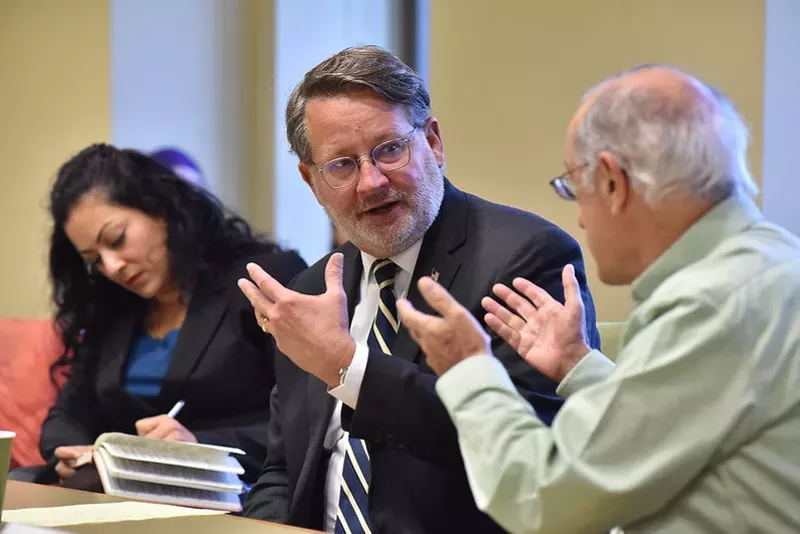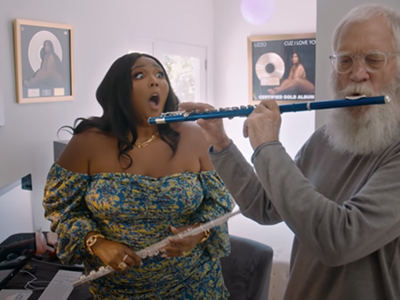
Audio By Carbonatix
[
{
"name": "GPT - Leaderboard - Inline - Content",
"component": "35519556",
"insertPoint": "5th",
"startingPoint": "3",
"requiredCountToDisplay": "3",
"maxInsertions": 100,
"adList": [
{
"adPreset": "LeaderboardInline"
}
]
}
]
When Sen. Gary Peters joined a small coterie of Detroit-affiliated members of the music business on Oct. 19 for an election-season Zoom call, the conversation began with topics like climate change, protecting the Great Lakes, and criminal justice reform. But the talk quickly turned to a looming issue: our pandemic-era inability to kick out the jams in person (and the fervent hope that we will be able to resume kicking them out soon).
Voices of Michigan and Third Man Records Cass Corridor sponsored the call, which included panelists Don Was and Wayne Kramer. Moderator Stefani Scamardo, president and founder of Evil Teen Records and Hard Head Productions and Management, talked about the personal impact of COVID-19 shutdowns on her work.
“I’m a manager, I represent artists. They’re not getting paid. They’re not on tour. It’s a difficult time,” Scamardo said.
Blue Note Records president Was painted a bleak picture of the current situation, in which live music is missing at the moment it is needed most.
“It doesn’t really matter whether you’re a record company president or a musician, or simply a fan or an audience member. The thing that unites all of us is the belief that music transforms the soul and brings people together and raises our spirits like nothing else on earth can,” Was said. “And in a year like this one, I think we need the power and the sound of live music more than ever, but the pandemic has transformed the live music business into a real disaster area.”
That disaster, Was added, goes beyond the musicians on the stage and encompasses “the whole economic infrastructure of the live music business,” including roadies, sound mixers, lighting designers, bus drivers, teamsters, gaffers, riggers, stagehands, ticket takers, ushers, and food and beverage workers.
“It’s estimated, I think, that for every $1 spent on tickets, a total of $12 in economic activity is generated. And all of these people are suffering. And they’re all struggling to make ends meet, and I see it firsthand,” Was said.
Peters acknowledged the importance of providing assistance to the live music industry. Peters wrote the Pandemic Unemployment Assistance Act, which extended unemployment assistance to workers in the gig economy. This was incorporated into the CARES Act when it passed in March, but that funding has now expired.
Peters said he hopes that protections for the live music business will be extended through some legislation that is pending in the Senate that he co-sponsored, including $10 billion in grants through the Save Our Stages Act and the loan program RESTART Act, which would cover six months of payroll, benefits, and fixed operating expenses for hard-hit businesses.
Peters noted the entrepreneurial spirit of musicians and venues, classifying them as small businesses that need to be protected.
“We have to make sure small businesses survive in this economy, or the economy is going to be weakened and it's not going to recover,” Peters said. “There's no way we can get this economy up and running as quick as any of us would like when we get through the health aspects of it fully, if small businesses disappear. They’re the engines of growth. They’re the people that hire folks.”
For ex-MC5 guitarist Kramer, the importance of protecting art and music is primal, transcending the economic considerations.
“I would say it's as important as breathing air. In our music and in our art is where we connect, where we form our communities,” Kramer said.
Brian J. Bowe is a freelance writer and journalism professor at Western Washington University
Stay on top of Detroit news and views. Sign up for our weekly issue newsletter delivered each Wednesday.







